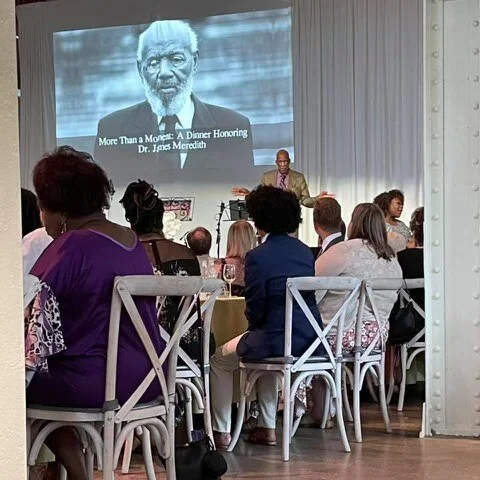Thoughts on the Cusp of Independence Day
It’s the cusp of this nation’s Independence Day, and I have had a few exhausting weeks with personal as well as professional reminders of the limitations which cage me due to being a barely documented immigrant in this country.
I’m waiting at yet one more institution’s building wherein I am providing paper after paper after plastic after plastic to prove my worthiness of fully living here for a span of just a few more months. Soon I will get to do it all over again because without a pathway to citizenship, I live in a hamster wheel of dehumanizing ups and downs. I can only plan my life in chunks as politicians (yet again) stall humane, comprehensive immigration reform. I can only roll my eyes as well-meaning, every-day people tell me to wait just a little longer like they have been telling me for more than one decade of my life.
A dinner honoring Dr. James Meredith, photo courtesy of author.
On this day while I wait, I’m reading Gustavo Gutiérrez’s thoughts from On Job: God-talk and the suffering of the innocent. I’m also praying, whatever that means. Mostly I’m sipping a cappuccino while people-watching. A family is laughing in Somali across the way. A mother is scolding her child in Spanish on the escalator. A couple, I assume, passes by me chatting away in English. Alongside the linguistic feast, there are rich skin hues from the darkest to the lightest and everything in between. The sunshine streaming through windows dances on my own brown, warming it. I think back to last week when I met Dr. James Meredith, who integrated higher education in the U.S., and who asked me, “Aren’t you a human? What have all these people done expect be born here? What makes you less worthy to have an opinion and a place here, if you want it!” Ah, yes. There it is. Do I want it?
This country and its people are some of my most loved. However, each time it has spat at me I’ve burned with angry sadness and grown more calloused towards it. And yet, when I watch the rain falling on the Mississippi River or sit in a restored prairie as the wind dances around me, I can believe it is beautiful.
The author, David Rojas Martínez, speaks with Dr. James Meredith. Courtesy of the author.
I think back to this past Sunday when Rev. Jared Stahler, in his sermon, invited me to revisit Amanda Gorman’s words of powerful truth The Hill We Climb: “Being American is more than a pride we inherit. It’s the past we step into and how we repair it.” And as I continue to wait on my ticket number to be called, I wonder if I have the courageous strength to continue stepping into a history of a people whose loudest voices tell me to, “Go home!” although such a place is elusive now. I feel myself becoming rooted in this place of city lakes and wooded areas that give way to endless fields of long goodbyes and apple pie. On my best days, I am reminded that this land of Native Americans is a place which claims to be a harbor for immigrants.
Last week, Dr. Terrence Roberts (one of the original Little Rock 9 who integrated U.S. schools) reminded me that others will have stories about me from their own perspectives, but that I need to be centered in my own.
As I observe these people around me in a babel of tongues and tapestry of skins with blue skies and sun outside, I am slightly tempted for one second to believe in the beauty of “spacious skies and amber waves of grain.”
And hours later, my number is called and I present my alien number.


